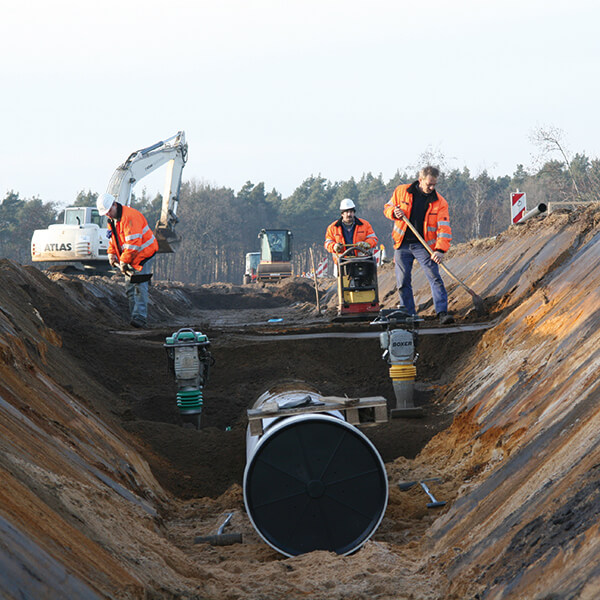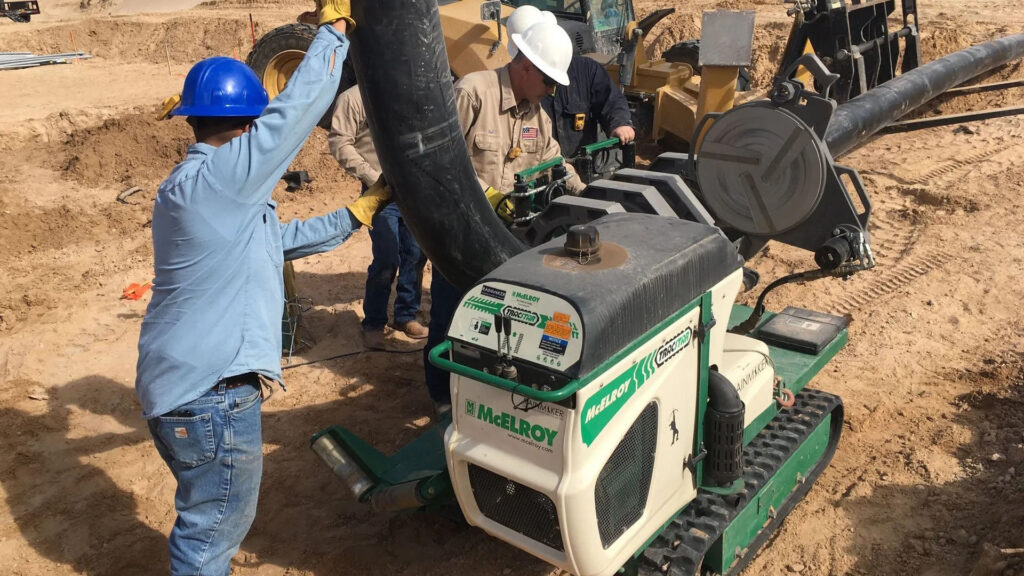Hidden Costs to Watch Out for in Pipeline Construction Services Contracts
The Necessary Guide to Recognizing Pipeline Construction Services and Their Relevance
Pipeline Construction services are essential to the transport of necessary sources such as water, oil, and gas. These solutions involve thorough planning and execution, adhering to rigid safety and security and environmental requirements. As the industry adapts to modern difficulties, comprehending its implications and components becomes progressively vital. What aspects add to the growing importance of these solutions in today's economic situation? The complying with areas will explore these critical facets.
Introduction of Pipeline Construction Providers
Pipeline Construction services include a series of tasks necessary for the setup and upkeep of pipelines made use of to deliver different materials, including gas, water, and oil. These solutions are important for ensuring the efficient and safe motion of sources from one location to an additional. The process commonly begins with extensive preparation and style, which takes into consideration regulatory requirements, ecological considerations, and logistical challenges.
Once planning is complete, excavation and grading of the land are performed to prepare the site for Pipeline setup. This is adhered to by the actual laying of the pipelines, which involves welding or joining sections with each other to develop a continuous circulation course. After installation, rigorous screening is done to guarantee stability and safety and security. Maintenance services are also offered to address any issues that might occur over time. On the whole, Pipeline Construction services play a pivotal role in supporting infrastructure for energy and water distribution.
Trick Elements of Pipeline Construction
An effective Pipeline Construction job depends on several essential elements that guarantee the efficient and secure setup of the Pipeline system. Extensive website evaluations are crucial, as they determine the environmental and geographical factors that may influence Construction. Next, the selection of ideal materials, such as fittings and pipelines, is necessary for protecting sturdiness and compatibility with the carried substances.
Moreover, progressed Construction techniques, consisting of trenchless innovation and directional exploration, improve efficiency and decrease environmental impact. Efficient project monitoring is one more vital component, working with labor, tools, and timelines to fulfill job objectives.
Furthermore, communication among stakeholders, consisting of designers, specialists, and local authorities, assurances placement on job requirements and requirements. Comprehensive top quality control steps throughout the Construction procedure make certain compliance with industry requirements and make best use of the Pipeline's operational lifespan. Collectively, these elements create the foundation of an effective Pipeline Construction project.
Security Requirements and Regulations in Pipeline Construction

Regulative bodies, such as the Occupational Safety And Security and Health And Wellness Administration (OSHA) and the Pipeline and Hazardous Products Safety Management (PHMSA), stated certain needs that control Construction techniques. These consist of protocols for equipment use, worker training, and emergency feedback procedures. By applying these requirements, Construction business not just secure their workers however also secure public trust. Inevitably, rigorous safety and security actions add to the long-lasting success of Pipeline jobs, ensuring they meet both operational and environmental assumptions.
Environmental Factors To Consider in Pipeline Projects

Ecological factors to consider are essential to the planning and execution of Pipeline projects. These projects have to analyze prospective influence on communities, water sources, and local wild animals. Carrying out detailed environmental influence analyses (EIAs) is vital, permitting stakeholders to determine and alleviate risks prior to Construction begins.
Securing sensitive locations, such as wetlands and environments, commonly needs executing details style functions or alternate routing to minimize interruption. Additionally, Pipeline operators are charged with establishing approaches for protecting against leakages and spills, which can have disastrous impacts on the atmosphere.
Engagement with local communities is important, as public problems can result in task adjustments that boost environmental management. Conformity with guidelines set by ecological companies ensures that jobs satisfy sustainability criteria, fostering a balance between framework requirements and eco-friendly preservation. Inevitably, attending to environmental factors to consider not only safeguards nature but also promotes area trust and project stability.
The Role of Modern Technology in Pipeline Construction
Innovation plays a vital role in modern Pipeline Construction, enhancing efficiency and accuracy. Advanced checking techniques allow for precise planning and implementation, decreasing ecological effect and job delays. In addition, the assimilation of automation and robotics enhances operations, decreasing labor costs and improving safety on Construction sites.
Advanced Surveying Techniques
Advanced checking methods play an important function in the effective implementation of Pipeline Construction tasks. These approaches utilize cutting-edge innovation to assure precise mapping and analysis of the surface where pipes will be mounted. Methods such as Geographic Details Equipment (GIS), LiDAR (Light Discovery and Ranging), and 3D modeling enable designers to evaluate have a peek at this website the landscape and visualize, determining environmental worries and prospective obstacles. By utilizing these innovative devices, groups can improve precision in placing and placement, substantially lowering the threat of errors during Construction. In addition, real-time information collection permits immediate modifications and notified decision-making throughout the project lifecycle. Eventually, these evaluating advancements add to enhanced efficiency, safety and security, and sustainability in Pipeline Construction initiatives.
Automation and Robotics

Economic Effect of Pipeline Facilities
Pipeline facilities plays a crucial duty in helping with and shaping local economies profession. By supplying a dependable methods of carrying oil, gas, and other assets, pipes minimize transportation costs and enhance supply chain effectiveness. This framework draws in investment, stimulates job creation, and cultivates economic growth in surrounding locations.
Moreover, the Construction and maintenance of pipelines contribute significantly to neighborhood economies, creating various employment possibility in various industries, from design to labor. The influx of work frequently results in increased investing in regional businesses, even more bolstering economic task.
In addition, pipes improve energy protection by making sure a steady supply of resources, which is important for industrial procedures and residential requirements. As areas become interconnected via Pipeline networks, they access to more comprehensive markets, raising competition and financial durability. The financial influence of Pipeline framework is multifaceted, influencing both instant local economies and broader local advancement.
Future Trends in Pipeline Construction Services
The future of Pipeline Construction solutions is advancing in action to technological improvements, regulative modifications, and growing ecological factors to consider. Technologies such as robotics and drones are simplifying assessment and maintenance processes, improving security and efficiency. Automation is positioned to minimize labor expenses and boost accuracy in Construction operations. In addition, the boosting emphasis on sustainability is motivating firms to take on environment-friendly products and practices, lining up with international initiatives to decrease carbon footprints.
Governing structures are also adapting to attend to environmental impacts, promoting greater transparency and liability in Pipeline jobs. In addition, the integration of smart innovations, consisting of real-time surveillance systems, is anticipated to improve the reliability and performance of Pipeline networks. As energy needs change toward renewable sources, Pipeline Construction solutions will likely see a rise in jobs associated with biofuels and hydrogen transportation. Overall, these trends suggest a transformative duration for the Pipeline Construction industry, focused on advancement and sustainability.
Regularly Asked Questions
What Sorts of Pipelines Are Typically Built?
Numerous sorts of pipelines are generally constructed, including oil, check my blog water, sewage, and gas pipelines - Pipeline Construction Services. Each serves unique purposes, promoting the transport of crucial resources across areas while sticking to security and ecological laws
The length of time Does a Regular Pipeline Project Take?
The duration of a common Pipeline job varies considerably, often ranging from a number of months to a couple of years. Factors affecting this timeline include job complexity, regulative approvals, and environmental factors to consider that must be dealt with.
Who Controls Pipeline Construction Firms?
Pipeline Construction firms are managed by numerous government, state, and neighborhood firms, consisting of the Pipeline and Hazardous Products Safety Administration (PHMSA) and state public energy commissions, making sure conformity with security and ecological requirements throughout the Construction process.
What Are Usual Materials Made Use Of in Pipeline Construction?
Common products used in Pipeline Construction consist of polyethylene, steel, and pvc. Each material supplies unique advantages such as toughness, resistance, and adaptability to rust, making them suitable for different applications in moving fluids and gases.

How Are Pipeline Construction Costs Approximated?
Pipeline Construction expenses are estimated by analyzing variables such as product costs, labor rates, task intricacy, environmental factors to consider, and governing needs (Pipeline Construction Services). Exact price estimate assurances efficient budgeting navigate to this website and task preparation throughout the Construction process
Pipeline Construction solutions incorporate a range of activities vital for the installment and maintenance of pipelines utilized to move various substances, consisting of gas, oil, and water. A successful Pipeline Construction task depends on several key elements that guarantee the safe and reliable installment of the Pipeline system. Advanced surveying techniques play an essential function in the successful implementation of Pipeline Construction jobs. Various kinds of pipes are frequently built, consisting of oil, sewage, water, and gas pipes. Pipeline Construction prices are estimated by evaluating variables such as product costs, labor prices, task complexity, environmental factors to consider, and regulatory needs.